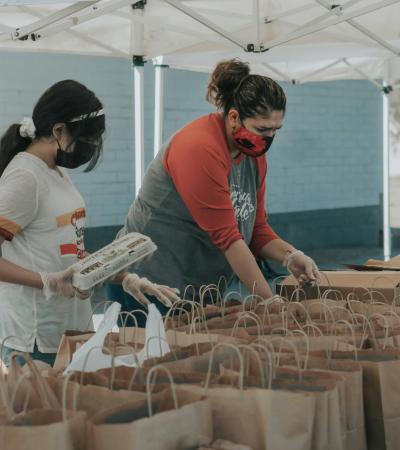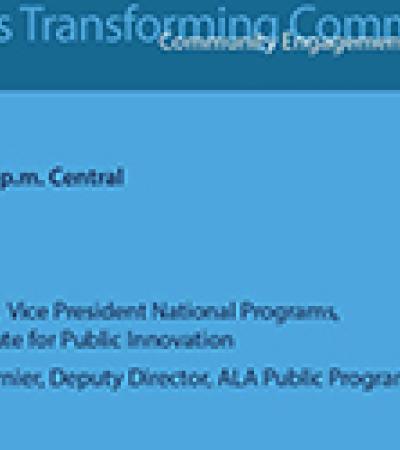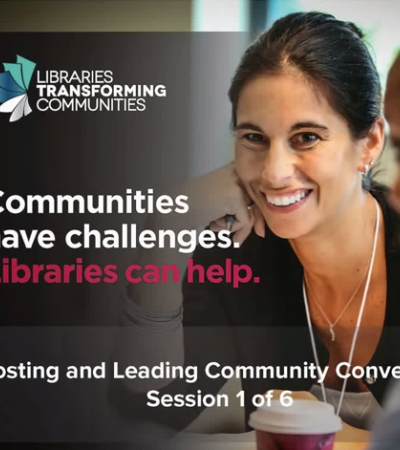ALA has released five case studies detailing the experiences of the Libraries Transforming Communities (LTC) Public Innovators Cohort, a group of public libraries that spent 18 months engaging their communities and taking a leadership role in driving community change.
The cohort, selected in 2014 through a competitive, peer-reviewed application process, was part of ALA’s LTC initiative, a national plan to help librarians strengthen their role as core community leaders and change-agents.
View the reports and comment online at www.ala.org/LTC. Download the complete set of case studies here [PDF].
The case studies describe the experiences, accomplishments and challenges as a range of libraries — from tiny Red Hook (N.Y.) Public Library to massive Los Angeles Public Library system — learned a new community engagement approach and began using it in their communities. The approach, known as Turning Outward, was created by The Harwood Institute for Public Innovation, ALA’s partner in the LTC initiative.
• Columbus (Wisconsin) Public Library: Innovative Solutions to Bridging Community Divisions describes how the once-rural community — now swiftly becoming a commuter town — helped bring together longtime residents and newcomers and built a stronger reputation as an institution that can help solve community challenges.
• Hartford (Connecticut) Public Library: Building on a Foundation of Success … and Going Deep to Go Broad describes how Hartford’s library — which has a long, successful history of community engagement work — led a series of community conversations to improve relationships between residents and police officers in an underserved part of the city.
• Los Angeles Public Library: Two Paths, One Destination: Culture Change in a Major Library System explores how library staff reevaluated their community engagement strategy and is continuing to plant seeds of change across the system.
• Red Hook (New York) Public Library: One Small Win Creates Huge Ripples of Change shares how a small public library helped get its community “unstuck” by tackling small challenges, such as a problematic traffic light, to show that change was possible.
• Spokane County (Washington) Library District: Building an Organizational Culture that Puts Community First illustrates how the 10-branch system made institutional changes, such as updating job descriptions to include community engagement activities, to create a library culture that put the community at the center of decision-making.
The ALA-Harwood Institute partnership is based on the idea that libraries, by virtue of their trusted position in their communities, are uniquely suited to help solve challenges of all types, from illiteracy to drug epidemics to distrust in government.
“The old model of libraries is not working anymore,” said Patrick Roewe, deputy director of the Spokane County Library District and LTC cohort member. “What was really critical about Libraries Transforming Communities is it gave us a path to follow that was more intentional … . It took some of the guesswork out of the approach.”
The Turning Outward approach involves asking the right questions to find out what community members really wants, and bringing together the right teams to help make those aspirations a reality. Libraries around the country are using the approach to better understand their communities and bring about positive change.
The training materials used by the cohort — including webinars, conversation facilitation guides, and worksheets designed for both individual and team use — are available, free of charge, at www.ala.org/LTC. The website also includes stories from five other cohort libraries: Knox County (Indiana) Public Library, San Jose (California) Public Library, Springfield (Massachusetts) City Library, Suffolk (Virginia) Public Library and Tuscaloosa (Alabama) Public Library.
For information about in-person workshops and conference sessions about LTC and the Turning Outward approach, visit www.ala.org/LTC/training.



